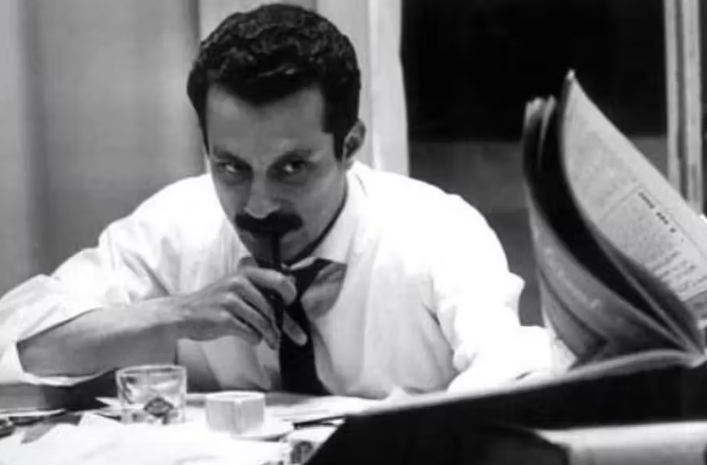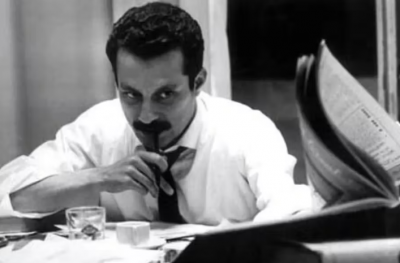The Palestinian resists with stones and any available weapons that can be manufactured domestically, trapped under a thousand sieges and watchful eyes. However, there remains a motivation that serves as a compass for their relentless struggle, choosing to draw the pulse of revolutions from the legacy of literature. This was highlighted by "The Conversation" in an article published by "Reuters," reviewing the close role literature plays in fueling the Palestinian will to resist and defend the land, sometimes armed with a verse from poetry by "Mahmoud Darwish" or others who chose to defend the usurped land through narratives, texts, and history that tell of the beauty of Palestine and its human legacy before the Nakba, and the suffering that followed after 1948, leading to the present day filled with attacks, sieges, and assassinations.
The Australian-British site, a pioneer in publishing research-based articles through collaboration between academics and journalists, begins with the idea of community oppression: "When a community experiences oppression and trauma, literature helps its people by providing a voice and reinforcing their identity. It gives voice to the trauma of those who have suffered, which is the case for Palestinians, whose literature—particularly the literature of resistance—plays this role. In fact, Palestinian writers are known for expressing their pains and sufferings, but also for contributing hope and aesthetic enrichment through literature. Palestinian literature is part of the broader Arab literature that dates back to the pre-Islamic era and is linked to the story of the Arabic language and its long-standing literary production. However, the first distinctive movements of Palestinian resistance poetry emerged under the British Mandate in Palestine (1918-1948).”
The article reflects on the role of poetry in documenting the stage of the British Mandate: “Poets lamented the destruction inflicted by the British on Palestinian society, particularly during the 1936-1939 revolt. During that period, poets such as Ibrahim Tuqan, Abdel Rahim Mahmoud, and Abu Salma Al-Karmi mourned those who sacrificed their lives to defend the land, highlighting the creeping danger posed by Zionism to Palestine as an established Arab homeland. They also addressed the Nakba of 1948, when Israel occupied 78% of Palestine, during the 1930s and 1940s. Thus, the poets addressed their homeland, expressed defiance, and conveyed the imminent danger lurking in exile and the hardships that befell them after 1948."
The article adds: "The rise of Palestinians in the 1960s through the Palestinian Liberation Organization marked another milestone in the journey of Palestinian poetic resistance. Palestinian poets from within what became known as Israel and from exile in refugee camps in neighboring countries met to express the experience of Palestinian dispossession and increasing waves of resistance against the Israeli occupation. This period was characterized by remarkable poetry and literary production by Palestinian poets and novelists, including the famous Palestinian novelist Ghassan Kanafani, who was assassinated by Israel in 1972, and prominent Palestinian poets such as Mahmoud Darwish, Samih Al-Qasim, and Fadwa Tuqan. Kanafani's novels such as "Men in the Sun" and "Returning to Haifa" open a wide horizon on the suffering of Palestinian refugees and their longing for their homeland."
The article further emphasizes that "the writings of the revolution contributed to establishing a literature of resistance against the Israeli occupation. Among all these significant figures, Darwish emerged as a symbol of Palestinian poetry at its highest level, gaining popularity both in Palestine and across the Arab world."
Urban Centers of Renewal
The article points to the role played by movements of renewal in Arab literature, where "capitals like Beirut, Baghdad, and Cairo served as stimulating grounds for innovation in the form and content of literature. Here, literature transcends ideology and doctrine, speaking to deeper aesthetic and human concerns. While rooted in time and space, it also expresses the fate and conditions of people trapped in tragedy."
Lebanese Capital
The article notes the struggle role played by Beirut through literature and cultural revival: “The Lebanese capital, Beirut, became one of the bright spots for Palestinian literature during the 1970s and 1980s, where Darwish lived. After the expulsion of the Palestinian Liberation Organization from Beirut in 1982, Darwish wrote some of his main literary works, including 'Memory for Forgetfulness,' which documents the horrific Israeli bombardment of Beirut and urges Palestinians to resist:
"Hedge your siege with madness!
And with madness!
And with madness!
Gone are those you love, they have departed...
Either (you are)
or (you aren’t)
The mask fell off the mask."
Darwish remained the strongest voice in the rich scene of Palestinian literature until his death in 2008, leaving behind an extraordinary record of resistance and beauty.
Literature with Multiple Voices
The article traces Palestinian literature in both its interior and diaspora forms: "Modern Palestinian literature is diverse and includes multiple voices, from those living in Palestine and those in exile, whether in the Arab world or the West. There have been some noteworthy translations of Palestinian literature into English and other languages—such as 'I Saw Ramallah' by Mourid Barghouti (1997) or 'Palestinian Walks: Forays into a Vanishing Landscape' by Raja Shehadeh, winner of the Orwell Prize in 2008. Over the past two decades, new writings in English by Palestinian authors became significant due to their intense engagement with the Palestinian situation. This new generation of Palestinian novels in English includes Susan Abulhawa’s 'Morning in Jenin' as well as Isabella Hamad’s debut 'The Parisian' and her second book 'Enter Ghost.' These novels grapple with historical and contemporary Palestine and the challenges faced by people trapped in the struggles of their homeland on both communal and individual levels."
The site highlights the richness of Palestinian writings on the Nakba, citing the book "The Map of Absence: An Anthology of Palestinian Writing on the Nakba," featuring nearly 50 Palestinian writers representing different threads in literature and trends.
It adds: "In all Palestinian writings, there is a strong desire to showcase the lives of Palestinians before the Nakba of 1948. Ghada Karmi is a good example. She was expelled with her family from Jerusalem in 1948, and her memoir, 'In Search of Fatima,' is a remarkable reflection of the immeasurable toll of dispossession and exile. Moreover, novels by Ibrahim Nasrallah, 'Time of the White Horses' and 'Lanterns of the King of Galilee,' evoke life in Palestine under multiple authorities, including the Ottoman Empire and then the British Mandate, before the country was irreversibly torn apart by Zionist forces in 1948."
The article concludes that "life in Palestine was safe and plentiful with good agricultural production, and culture was rooted in seasonal activities surrounding olive picking, communal songs, and various performances in beautiful Mediterranean cities like Haifa and Akka. The Nakba changed all that in 1948—the Israeli narrative about Palestinians denies them voice, existence, and agency. Palestinian literature represents a magnificent story of a people whose creativity and will to live continue to shine through poetry, novels, paintings, and music amidst the ongoing oppression of the Israeli occupation and growing inhumanity."




